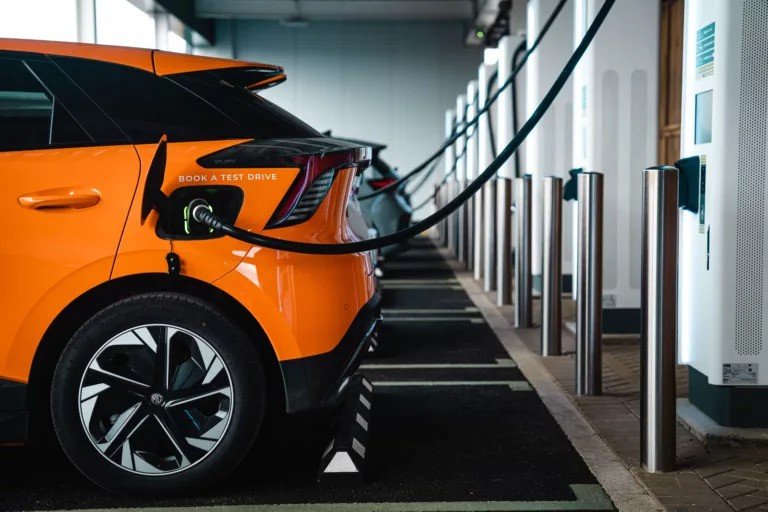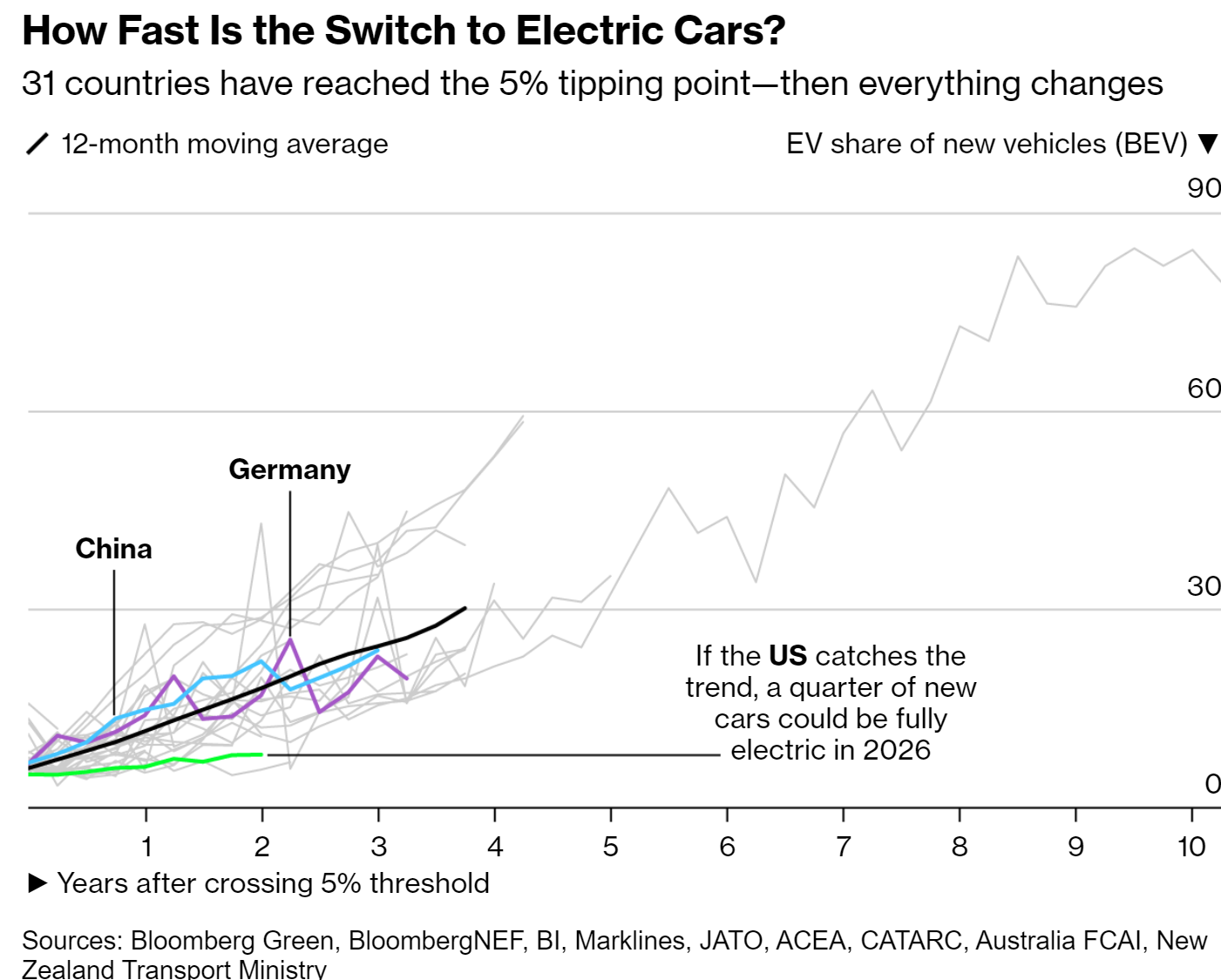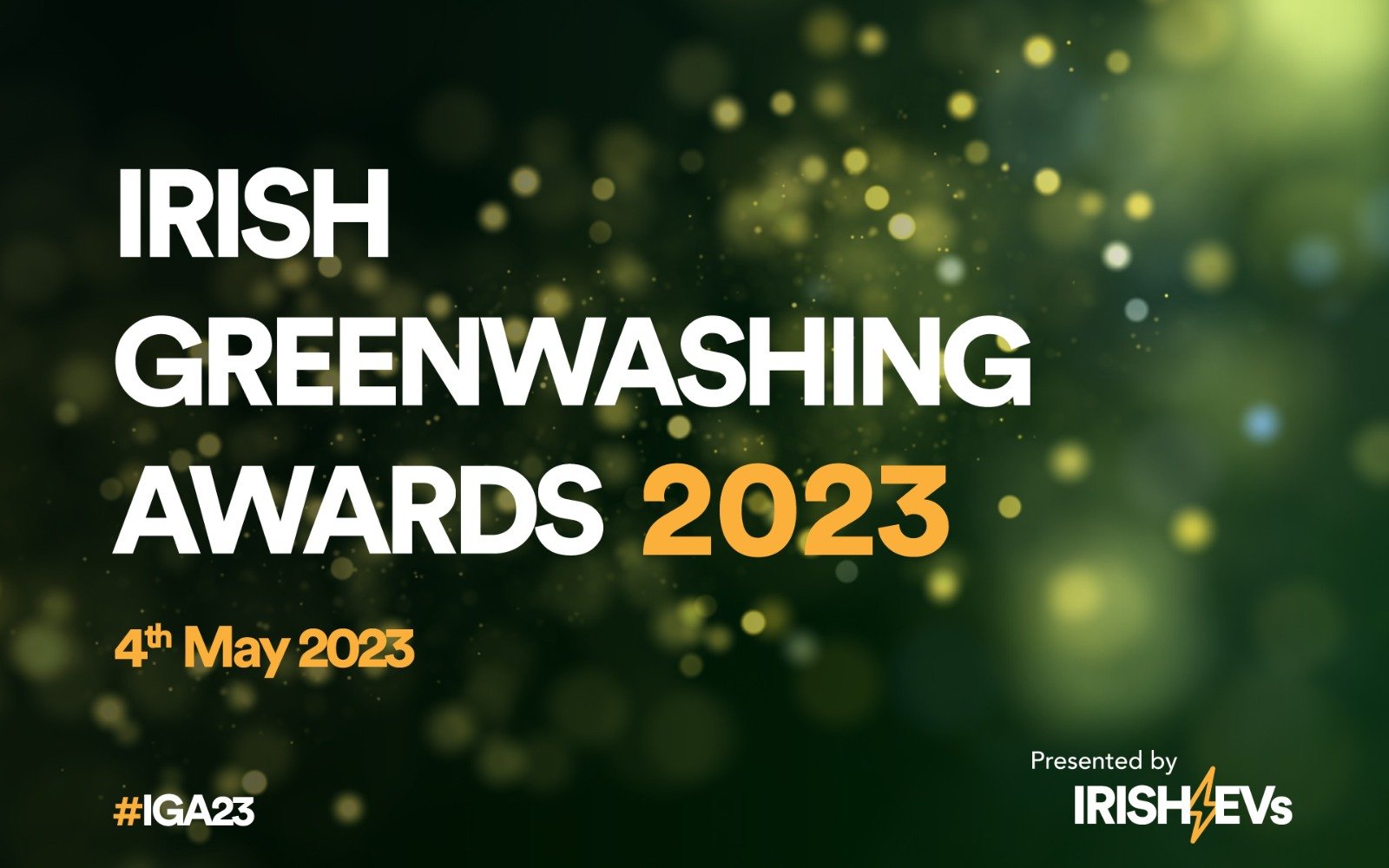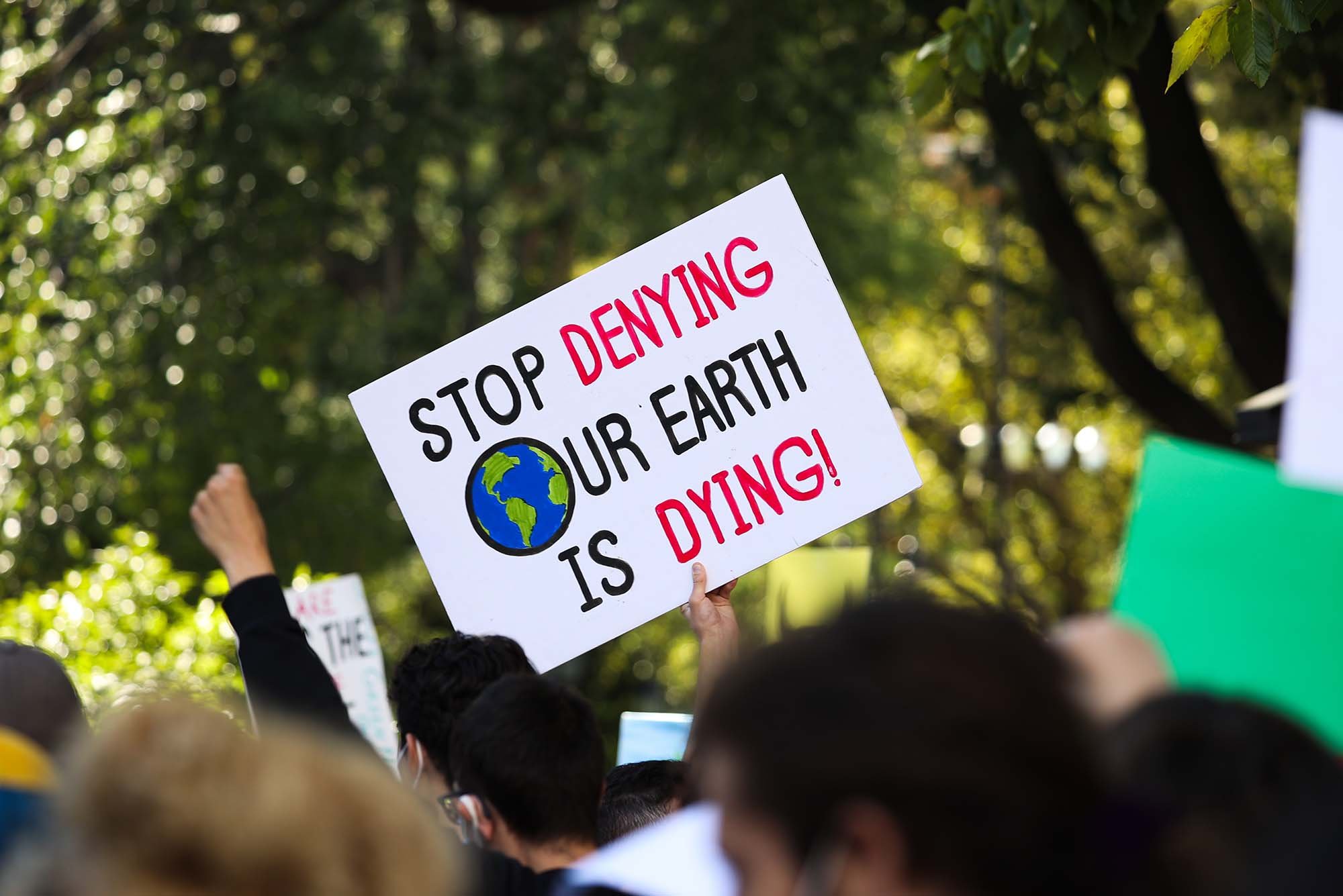
The Real Reason EV Adoption Is Slowing
It is undeniable that EV adoption in Ireland has slowed significantly in the last year.
For example, registrations of new electric vehicles have fallen 19.1% between January-April 2024 compared with the same period in the previous year. As a result, many sections of the Irish press have been querying the cause over recent weeks.
Yet, Ireland is an outlier in this respect. As Bloomberg noted in March 2024, electric cars have passed the tipping point to mass adoption in 31 counties, up from just 19 countries in 2022.
As such, it is clear that Ireland is doing something uniquely wrong as we further jeopardise our climate and emissions targets.
So, what is it that makes countries like Ireland so unique when it comes to stalling EV sales?
Money & Government Failure
The Irish Government pledged that it would hit one million EVs on the roads by 2030 – a promise that really was never delivered with any sincerity, and which includes a great number of hybrids, which are entirely fossil fuel-dependent.
Yet, as of 2024 the Government is still keeping up this pretence despite the growing likelihood that this will be yet another vital – and easy – emissions reduction target that will be missed by a wide margin.
Much of the failure to maintain EV growth lays at their feet, in spite of many calls for change and transparency.
EV registrations in April 2024 have fallen below those seen in 2022. Despite a large spike in July 2023 - caused by dealers pre-registering cars to avail of the grants before they were cut - EV registrations have fallen off a cliff. This is the Irish Government’s failure in action. Data source: SIMI
Last July, they cut the grants for EVs, which led to a massive spike in dealers pre-registering vehicles before an enormous drop-off. So significant was the almost immediate decline in sales, that from September to December EV registrations were below 2022 levels for the same period.
It was already apparent that EV grants weren’t working and that more assistance was needed – not less. Fantastic research from Trinity College Dublin showed that EV grants were mostly helping those who already had the means to change, who were typically buying an EV as a second or third car rather than replacing an ICE.
As the cost-of-living and Climate Crises have significantly worsened over recent years, the Government has systematically failed to make EVs accessible to those who would benefit most from lower running costs.
Calls to remove import duties, to make available interest-free loans and other measures to help people on lower incomes access the benefits of electric vehicles have fallen on wilfully deaf ears.
Yet, in spite of their continued abject failure, the Irish Government may not be the most influential figure in stemming EV adoption.
Many countries have quickly reached the tipping point for EV adoption, and there appears to be correlation between those nations where there are consistently good incentives and low media misinformation. Credit: Bloomberg NEF
Media Misinformation
While it is hardly new that the media has platformed misinformation about almost every form of climate action – or even platformed disinformation and culture wars about the Climate Emergency itself – there has been a notable ramping up of anti-EV sentiment in the Irish and British press over the past year.
On 23rd April, RTE ran an article called “’Perfect storm’ brings €2 per litre fuel back in prospect”. This article entirely ignored the vital context of the Climate Crisis, but it also platformed misinformation and hearsay about EVs:
“But issues around the charging infrastructure, ‘range anxiety’ and concerns about the declining resale value of electric models has seen people dropping their intentions to go electric of late and, anecdotally at least, some have been making the move back to combustion-engine powered vehicles.”
We challenged the journalist responsible for this article to provide evidence to support this claim. Brian Finn admitted that he was unable to and, in fact, asked us to provide evidence to the contrary, claiming that he had friends that were making the switch.
It is not beholden on us to disprove misinformation – it is a matter of journalistic integrity to have data to support your claims. And the truth is that there is no independent or academic data anywhere in Europe to support these claims on any trustworthy scale.
In short, this is Ireland’s national broadcaster boldly stating misinformation alongside tired old tropes like ‘range anxiety.’ This is the media playing an active role in delaying EV adoption.
This isn’t a one-off. And perhaps there can be no better example than that shown recently in The i.
On 29th March, Emma Henderson, a former food journalist, wrote an article titled “I sold my electric car and went back to diesel – I’d had enough.”
The article followed a so-called #journorequest on Twitter – used by journalists to find contributors to a story.
She received 113 replies to her tweet. She did not receive a single response that supported her premise. She did, however, get over 100 replies from people telling her that they had swapped from ICE to EV and would never go back.
In fact, the comments below her request for contributors on X/Twitter were full of people with positive experiences following their switch to driving electric cars. Many even questioned why she wouldn’t report on the positive stories and why hit pieces such as this were being written during the Climate Emergency.
Their comments were repeatedly met with a frosty, argumentative tone by Henderson “Are you part of an EV cult?” Even those that didn’t question the validity of her angle (e.g. “9 years EV, anyone would be absolutely mad to go back to ICE vehicles”) were met with a highly bias and aggressive tone: “Fine, that’s your experience and opinion but you have to accept that’s not everyone’s”.
Two of her replies to well-intentioned, positive and helpful EV owners provided vital insights into what may have inspired this article:
“I am quite entitled to look for people with specific experiences, as thousands of journalists do every single day. I, just like any other journo, can and should report on the underrepresented side of the sorry (sic) too”
“My charging experience in London was a nightmare”
The inherent bias in Henderson’s article was clear from the outset. This piece, run in a Daily Mail-owned publication, was always going to be a tone-deaf hit piece that ignored the Climate Emergency. Her refusal to answer our questions only reiterated that. Credit: Twitter
Could it really be that this freelancer who ‘specialises in writing about food and drink, sustainability, and reducing single-use plastics’ really wrote such a negative article because of user error – that she failed to plan ahead when needing to charge and chose to use her national platform to promote myths, misinformation and a wholly one-sided view of electric vehicles?
Surely a journalist who ‘specialises in sustainability’ would at least include some context about the Climate Emergency or the impact on public health when writing an article that seeks to justify or advocate for switching from ICEs to EVs.
Of course not.
Instead, Henderson’s article states: “According to the UK-wide independent car supermarket Motorpoint, 56 per cent of EV drivers part-exchanged for an alternative fuel type in 2023, with petrol dominating the choice at 30 per cent.”
We contacted Motorpoint to clarify this, as this sounded like an alarmingly high figure – and as the central piece of data used by Henderson to build her whole article around, perhaps it offered some insight into a worrying new trend…
Nope.
Climate misinformation, disinformation and denial is increasing in the press at the same time that articles about the Climate Crisis have been reducing in number and the many climate-focused journalists have been laid off. Credit: Murphy et al
Motorpoint’s PR representative confirmed that “It’s a piece of research/data analysis that we pulled together exclusively for that feature.”
While the data did show that 56% of EV owners swapped from EV to ICE this was based on a dataset of just 171 customers between 1st January to 31st December 2023. That is hardly a sample size from which any national trends can be extrapolated from.
Furthermore, this conflicts with multiple other reports that suggest that either more and more people who drive internal combustion engine vehicles intend to make the switch to an EV, or that BEV owners already see the many benefits of their cars and wouldn’t go back.
The financial benefits are a particular boon for EV drivers, with the Irish Mirror recently reporting that as many as 90% of BEV drivers have seen an obvious saving in their running costs – based on a survey by DoneDeal.
Of course, this is a spurious PR survey in the same way that the Motorpoint survey is, but if that is the benchmark that national news publications are willing to use as the basis for their disinformation articles, then surely this is just as valid by the same logic.
Since we challenged Henderson on her platforming of spurious data and disinformation, a small caveat has been added at the foot of the article stating “An RAC study from 2021 found 90% of EV owners won’t switch back to petrol or diesel cars.”
She has not come back to us on our emails, questioning the validity of this article, the inherent bias it contained. Nor did she answer our questions about the fact that she had almost exclusively platformed high-wealth edge cases, such as someone stating they couldn’t possibly drive an EV with anything less than 500 miles of range, when the average car journey in the UK is just 8.4 miles.
Henderson’s article in The i – which is owned by the Daily Mail – relies on spurious data, prominent EV misinformation figures like Harry Metcalfe (who is also a long-time climate denier), and an inherent bias that stuck with a hit piece approach while ignoring all opportunities for balance and the overwhelming appeals of EV owners wishing to share their good stories in response to her Journo Request.
Like the RTE piece, it also lacks any reference to the vital context of the Climate Emergency.
Climate Context
We write about EVs in the context of the Climate Crisis solely because we believe they have a role to play in helping us avert the worst outcomes of the Climate Emergency.
Yes, it is absolutely true that swapping all fossil fuel-powered cars to EVs will perpetuate the same old problems that cars present now – from the space required for parking infrastructure, to road deaths and extraction/consumption of resources.
However, with transport accounting for 17.7% of Ireland’s greenhouse gas emissions (second only to agriculture) and private cars accounting for the vast majority of this figure (aviation being unclear and broadly untracked), making the switch to EVs presents an opportunity to cut our emissions to improve both human and planetary health, and break free of the poverty cycle that fossil fuels have created.
They are not a silver bullet, and all-too-often the focus of EVs is on cars. Whereas we believe that all public transport should be electric, as well as low-mileage vehicles like tractors, post vans and bin collection vehicles. Of course there are applications for electrifying active travel too.
Every time the Irish Government and the Irish press fail to talk about EVs – or any vehicles – in the context of the Climate Emergency, they are failing to talk about them in the most vital context and failing to educate the public.
We are way off course for emissions reductions in line with legally-binding climate pledges. With less than six years remaining in our global carbon budget, it is vital that we cut all greenhouse gas emission as drastically as possible. Credit: UN IPCC AR6 Synthesis Report
Is it any wonder that 87% of all car sales in Ireland in 2024 are entirely reliant on fossil fuels when parts of our press peddles totally unfounded misinformation or platforms denial, and our Government is still lying to us about meeting climate targets that we look doomed to miss by a wide mark.
Until there is greater press and political accountability, we will continue to fail. We urge our readers to continue calling out journalists who platform misinformation and disinformation, or who continue to write hit pieces that overlook the realities of the Climate Emergency.
What To Read Next
Irish Greenwashing Awards 2023
The second annual Irish Greenwashing Awards highlight the prevalence of greenwashing, award the worst offenders, and call for urgent anti-greenwashing legislation to protect the people of Ireland
Ireland Urgently Needs Anti-Greenwashing Legislation
It is imperative that the Irish Government follows the examples of France & the Netherlands to introduce legislation to protect Irish people from greenwashing








